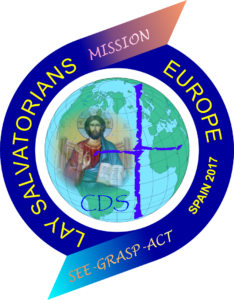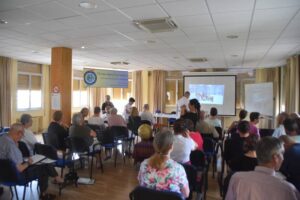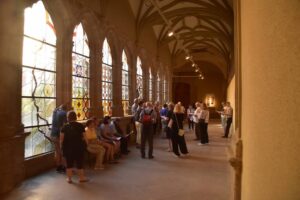 Mission: see – grasp – act
Mission: see – grasp – act
Groups and people of eleven nations (units) including one member from the US met in Logroño/Spain for the 5th (6th) European Lay Salvatorian encounter from June 8 – 11. The topic was “Mission: See – grasp – act” and we got three excellent keynote speakers for this event. Fr. István Barazsuly SDS from Rumania, Fr. Michel Coppin SDS from Belgium, and Ms. Mª Ángeles Molina CDS from Spain, who works as missionary in Guatemala at the moment.
Fr. István talked about the challenges and necessities in his country Romania. It is in some parts an example of the religious situation in Europe. The people, and even many of the young people, are searching and open for spiritual things in their life. Certainly the “wrapping” of the religion does not match the challenges and needs of the life of today. So we have to find new interpretations of the old truths and new doorways into people’s heart and we have to recognise that Europe is an area for mission today. A big challenge is the poverty which is a basis that people get into dependencies and get forced into several forms of modern slavery by criminals in whole Europe. Cooperation with other units is important to intensify and improve the awareness of this situation.
 Fr. Michel gave a general overview of the topic “mission”, also the changes of the understanding what mission means over time. In the past mission was often misused as tool for power, exploitation and also enslavement by European countries. The 2nd Vatican council changed some of the orientations of mission. An indoctrination and evangelization without respect of the culture and mentality has not longer been an option for the Catholic Church since that time. Certainly some people were unsettled by those changes and other decisions of the council and they left the church. So some time was needed to reorganize the mission to match these new goals – which are the goals of mission in the proper sense.
Fr. Michel gave a general overview of the topic “mission”, also the changes of the understanding what mission means over time. In the past mission was often misused as tool for power, exploitation and also enslavement by European countries. The 2nd Vatican council changed some of the orientations of mission. An indoctrination and evangelization without respect of the culture and mentality has not longer been an option for the Catholic Church since that time. Certainly some people were unsettled by those changes and other decisions of the council and they left the church. So some time was needed to reorganize the mission to match these new goals – which are the goals of mission in the proper sense.
A special point was a survey on the Salvatorian missions. These missions show a positive effect until the present; although no Salvatorians are working and living in these areas today. On the basis of the still increasing numbers of the catholic communities we can see that Salvatorians did and do a very efficient work.
Ms. Mª Ángeles Molina CDS presented her work in Guatemala and the motivation for it. It is important to support the people there in their daily life. Many things are missing there which is a matter of course here in Europe. On the other hand the people are very skilful in improvising. The problems can be solved only sustainably therefore it is important for the people to get help to help themselves. So they get back their feeling of self-esteem and discover that their work brings success. Furthermore their view of the world has to be paid respect especially with people with indigenous roots. They show great veneration for the surrounding environment and as long as we as Christians live our respect for God’s creation seriously we are able to have access to this worldview. Unfortunately, also here poverty is the basis for several forms of modern slavery and the cooperation with and support of other units is a need.
 In small groups we discussed our personal access to “mission” in general and especially the Salvatorian mission, how we could implement this mission more in our life and which common objectives and action programs would be necessary to mobilize the Salvatorian mission. An important point for the future is to find ways to reach and integrate young people.
In small groups we discussed our personal access to “mission” in general and especially the Salvatorian mission, how we could implement this mission more in our life and which common objectives and action programs would be necessary to mobilize the Salvatorian mission. An important point for the future is to find ways to reach and integrate young people.
 The cultural program included a visitation of the historic part of Logroño with some very old churches, a short pilgrimage walk on a part of the pilgrimage path to Santiago de Compostela, a visit and Eucharist at the Virgin of Valvanera in the Benedictine monastery of Valvanera.
The cultural program included a visitation of the historic part of Logroño with some very old churches, a short pilgrimage walk on a part of the pilgrimage path to Santiago de Compostela, a visit and Eucharist at the Virgin of Valvanera in the Benedictine monastery of Valvanera.
The whole meeting was carried by prayers and Eucharists prepared by the various units and the different languages have demonstrated not to be a hurdle but an enrichment. It was a strong sign of our Salvatorian unity in diversity. We all are looking forward on the next meeting perhaps in two years, wherever it will be.
Latest posts by Christian (Posts)
- Easter message – Mensaje de Pascua 2024 - 30. März 2024
- February 8: world prayer day - 7. Feber 2024
- Merry Christmas – Feliz Navidad – Feliz Natal – Joyeux Noël – Frohe Weihnacht - 22. Dezember 2023




